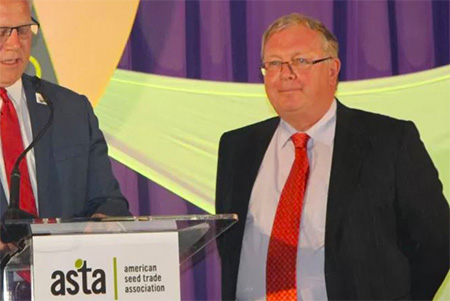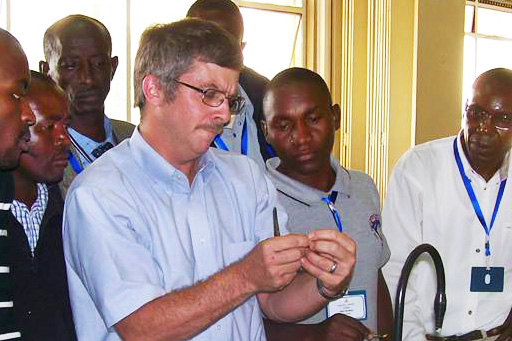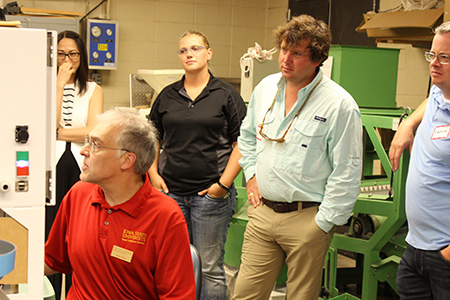Seed Science & Technology
Short Course Overview
*The Seed Science & Technology Short Course is moving to a FREE Virtual Webinar Series for November 2020. You can find out more and register HERE.
Seed companies invest significant amounts of time and money to conduct research and development in the creation of superior products. One of the most important decisions a company makes is which products to commercialize. Once a product is commercialized the most significant variable cost to the company is undertaken during seed production. Since it may take up to 10 years to develop a new product the extent of the life cycle of that particular product, in terms of the number of years it will be produced and sold to customer/farmers is critical to the financial success of the company. Plant breeding continues to create new and better performing products which tend to shorten the life cycle of seed products. This along with the advent of biotechnology traits which has created a proliferation of the number of products, makes the management of product life cycle a critical aspect in the success of a seed company.
This in-depth course provides information on how Seed Production turns the potential provided by Research into the reality of a high quality product that can be sold with confidence to farmer/customers. Topics covered include Planning, Relationship with Growers, Grower Contracts, Production of Parent Seed Stocks and Production of Commercial Seed. This includes details on seed field preparation, planting, integrated pest management, flowering/pollination management, harvest and the importance of seed quality throughout all these operations.
Crop Improvement:
Improvement of crop performance is a continuous process because of the necessities to improve agricultural productivity and nutritional quality in the face of ever changing climates, pressures from evolving insects, pests, and weeds, and the need to contribute to agricultural productions systems that are increasingly sustainable and help to conserve lands and biodiversity. The improvement of crop yields is dependent upon an increase in yield due to genetic change (genetic gain) interacting with the environmental effects of weather and the agronomic management abilities of individual farmers. We will focus on the genetic aspects of crop improvement with a review of inheritance of single genes and the more prevalent and agronomically important multi-genic traits. We will review basic concepts of plant breeding including selection intensity, heritablity, genetic gain. inbreeding depression and hybrid vigour. We review basic principles of plant breeding by investigating why US farmers had not been successful in raising corn yields before the era of hybrids. The only thing that is “traditional” about agriculture and plant breeding is that methods are always changing. We will review new methods available to breeders and discuss future approaches that may be required to continue past success of plant breeding into the future.
Variety Testing & Development:
Without high quality variety testing both advancement by breeding and more effective farm management, including choice of variety to plant would be stymied. Effective variety testing requires excellence in agronomy, biology, physiology, basic genetics, statistical design and analysis. Variety testing is vital to identify the best fit of new genetic combinations developed by breeding with target agronomic environments and farm management practices. To disentangle genetic from environmental effects it is necessary to develop a full knowledge of both the testing locations and the target production environment. Appropriate field trial and plot design are critical. Variety testing is crucial at each stage of the breeding process, becoming increasingly rigorous as numbers of potential new varieties is reduced to the best of the best for commercial release. Trials are required for both base germplasm, for genetically modified event selection, and for base germplasm when combined with genetically modified traits. Variety testing does not end at commercialisation as fresh data on genotype x environment x management continues to provide further knowledge useful both to breeders and to farmers to optimise fits of genotype x environment x crop management. Variety testing is also important to obtain intellectual property protection of new varieties to encourage further investment and innovation in plant breeding.
Precision Ag:
This short course session provides knowledge on Big Data systems and the advancements in Remote Sensing technologies in Ag. As the Ag market grows and pushes for higher yields this causes the growth for Precision Ag systems, dealing with aggregated data “Big Data” and Remote Sensing systems.
Seed physiology is the study of the biological and biochemical processes occurring in seeds, from initiation and formation to its death. Throughout their life, seeds interact and react to environmental changes around them. This interaction happens while seeds are in the plant, during and after harvest, in storage, and while they germinate to regenerate a new plant.
In this lecture, we will learn of the changes in seed as they develop and mature in the plant, the steps orthodox seeds (most crop and horticultural seeds) undergo to survive dehydration, and their differences with seeds that are incapable of undergoing this adaptive step. We will also evaluate the environmental conditions that accelerate or decelerate seed deterioration and death during seeds’ dry state, and learn how different levels of seed deterioration affect seed germination and regrowth under favorable and unfavorable environmental growing conditions.
Seed quality is defined as the germination, vigor, and composition characteristics that allow seeds to emerge and establish a healthy plant stand in the field. The Seed quality testing session will focus on a seed systems approach to understand the fundamental interactions between environmental factors, transgenic traits, and plant genetics.
Week At A Glance: November 02 – 06, 2020
*The Seed Science & Technology Short Course is moving to an online format for 2020, please stay tuned for details.
(Schedule is subject to modifications)
Short Course Dates
Seed Business Management
April 5-9, 2021
*Due to Covid-19, the SBM short course is moving to a FREE Virtual Webinar Series for April 2021. You can find out more and register HERE.
Seed Science & Technology
Dates: TBD
Registration Fee
$2,550/person
Cancellation & Minimum Attendance Policy
Location
Seed Science Center
Iowa State University
2115 Osborn Drive
Ames, Iowa 50011
Questions?
Please contact:
Cindy Robertson
STB Short Course Coordinator
515.294.6947
cindyr@iastate.edu
Educational Credit
You can earn CEU and CCA credit at this program.
Previous Short Courses
November 2019
February 2019
November 2018
February 2018
November 2017












